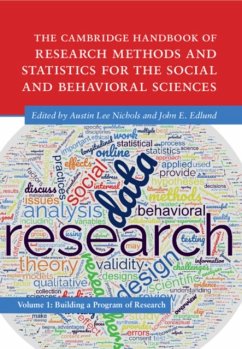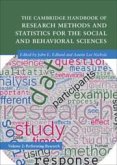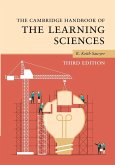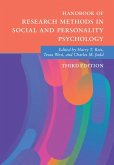The Cambridge Handbook of Research Methods and Statistics for the Social and Behavioral Sciences
Herausgeber: Nichols, Austin Lee; Edlund, John
The Cambridge Handbook of Research Methods and Statistics for the Social and Behavioral Sciences
Herausgeber: Nichols, Austin Lee; Edlund, John
- Broschiertes Buch
- Merkliste
- Auf die Merkliste
- Bewerten Bewerten
- Teilen
- Produkt teilen
- Produkterinnerung
- Produkterinnerung
This handbook covers some of the most cutting-edge topics in research methods and statistics across the social and behavioral sciences. It is written by knowledgeable and prolific methodologists and statisticians from around the globe and is a must own for anyone interested in conducting high-quality research.
Andere Kunden interessierten sich auch für
![The Cambridge Handbook of Research Methods and Statistics for the Social and Behavioral Sciences The Cambridge Handbook of Research Methods and Statistics for the Social and Behavioral Sciences]() The Cambridge Handbook of Research Methods and Statistics for the Social and Behavioral Sciences76,99 €
The Cambridge Handbook of Research Methods and Statistics for the Social and Behavioral Sciences76,99 €![The Cambridge Handbook of the Learning Sciences The Cambridge Handbook of the Learning Sciences]() The Cambridge Handbook of the Learning Sciences67,99 €
The Cambridge Handbook of the Learning Sciences67,99 €![The Cambridge Handbook of Research Methods in Clinical Psychology The Cambridge Handbook of Research Methods in Clinical Psychology]() The Cambridge Handbook of Research Methods in Clinical Psychology87,99 €
The Cambridge Handbook of Research Methods in Clinical Psychology87,99 €![The Cambridge Handbook of Social Representations The Cambridge Handbook of Social Representations]() The Cambridge Handbook of Social Representations69,99 €
The Cambridge Handbook of Social Representations69,99 €![Handbook of Research Methods in Social and Personality Psychology Handbook of Research Methods in Social and Personality Psychology]() Handbook of Research Methods in Social and Personality Psychology180,99 €
Handbook of Research Methods in Social and Personality Psychology180,99 €![The Cambridge Handbook of Computational Cognitive Sciences The Cambridge Handbook of Computational Cognitive Sciences]() The Cambridge Handbook of Computational Cognitive Sciences389,99 €
The Cambridge Handbook of Computational Cognitive Sciences389,99 €![The Cambridge Handbook of Substance and Behavioral Addictions The Cambridge Handbook of Substance and Behavioral Addictions]() The Cambridge Handbook of Substance and Behavioral Addictions54,99 €
The Cambridge Handbook of Substance and Behavioral Addictions54,99 €-
-
-
This handbook covers some of the most cutting-edge topics in research methods and statistics across the social and behavioral sciences. It is written by knowledgeable and prolific methodologists and statisticians from around the globe and is a must own for anyone interested in conducting high-quality research.
Produktdetails
- Produktdetails
- Cambridge Handbooks in Psychology
- Verlag: Cambridge University Press
- Seitenzahl: 600
- Erscheinungstermin: 8. Juni 2023
- Englisch
- Abmessung: 254mm x 178mm x 43mm
- Gewicht: 1600g
- ISBN-13: 9781108995245
- ISBN-10: 1108995241
- Artikelnr.: 64536468
- Herstellerkennzeichnung
- Libri GmbH
- Europaallee 1
- 36244 Bad Hersfeld
- gpsr@libri.de
- Cambridge Handbooks in Psychology
- Verlag: Cambridge University Press
- Seitenzahl: 600
- Erscheinungstermin: 8. Juni 2023
- Englisch
- Abmessung: 254mm x 178mm x 43mm
- Gewicht: 1600g
- ISBN-13: 9781108995245
- ISBN-10: 1108995241
- Artikelnr.: 64536468
- Herstellerkennzeichnung
- Libri GmbH
- Europaallee 1
- 36244 Bad Hersfeld
- gpsr@libri.de
Section 1. From idea to reality: the basics of research: 1. Promises and
pitfalls of theory Yzar S. Wehbe, Todd K. Shackelford and Laith Al-Shawaf;
2. Research ethics for the behavioral and social sciences Ignacio Ferrero
and Javier Pinto; 3. Getting good ideas and making the most of them
Christian S. Crandall and Mark Schaller; 4. Literature review Rachel Adams
Goertel; 5. Choosing a research design Glynis M. Breakwell; 6. Building the
study Martin Schnuerch and Edgar Erdfelder; 7. Analyzing data Roger Watt
and Elizabeth Collins; 8. Writing the paper John F. Dovidio; Section 2. The
building blocks of a study: 9. Participant recruitment Jesse Chandler; 10.
Informed consent to research David S. Festinger, Karen L. Dugosh, Hannah R.
Callahan and Rachel A. Hough; 11. Experimenter effects Jocelyn Parong,
Mariya Vodyanyk, C. Shawn Green, Susanne M. Jaeggi and Aaron R. Seitz; 12.
Debriefing and post-experimental procedures Travis D. Clark and Ginette
Blackhart; Section 3. Data collection: 13. Cross-sectional studies Maninder
Singh Setia; 14. Quasi-experimental research Charles S. Reichardt, Daniel
Storage and Damon Abraham; 15. Non-equivalent control group
pretest-posttest design in social and behavioral research Margaret Denny,
Suzanne Denieffe and Kathleen O'Sullivan; 16. Experimental methods Thomas
F. Denson and Craig A. Anderson; 17. Longitudinal research: a world to
explore Elisabetta Ruspini; 18. Online research methods Kevin B. Wright;
19. Archival data Jason Miller; 20. Qualitative research design Sinikka
Elliott, Kayonne Christy and Siqi Xiao; Section 4. Statistical approaches:
21. Data cleaning Solveig A. Cunningham and Jonathan A. Muir; 22.
Descriptive and inferential statistics Martha S. Zlokovich, Daniel P. Corts
and Mary Moussa Rogers; 23. Testing theories with Bayes factors Zoltan
Dienes; 24. Introduction to exploratory factor analysis: an applied
approach Martin Sellbom and David Goretzko; 25. Structural equation
Modeling Rex B. Kline; 26. Multilevel modeling D. Betsy McCoach, Anthony J.
Gambino and Sarah D. Newton; 27. Meta-analysis in the social and behavioral
sciences Jessica Gurevitch, Anne Moyer and Yuri Jadotte; 28. Qualitative
analysis Nicky Hayes; 29. Designing a line of research Sheldon Solomon,
Jeff Greenberg and Tom Pyszczynski; Section 5. Tips for a successful
research career: 30. Successfully publishing research in the social and
behavioral sciences Sicong Liu and Dolores Albarracin; 31. Presenting your
research Kelly Cuccolo; 32. Building fruitful collaborations Mary G. Carey
and Wendy M. Brunner; 33. Performing a good peer review Klaus Fiedler and
Christian Unkelbach; 34. Handling submitted manuscripts: as editor and
author Lisa L. Harlow; 35. Grant writing basics Tamera R. Schneider, Howard
C. Nusbaum and Jennifer N. Baumgartner; 36. Teaching research methods and
statistics Jordan R. Wagge; 37. Working outside academia Kevin A. Byle,
Jeffrey M. Cucina, Alexis Avery and Hanna Pillion.
pitfalls of theory Yzar S. Wehbe, Todd K. Shackelford and Laith Al-Shawaf;
2. Research ethics for the behavioral and social sciences Ignacio Ferrero
and Javier Pinto; 3. Getting good ideas and making the most of them
Christian S. Crandall and Mark Schaller; 4. Literature review Rachel Adams
Goertel; 5. Choosing a research design Glynis M. Breakwell; 6. Building the
study Martin Schnuerch and Edgar Erdfelder; 7. Analyzing data Roger Watt
and Elizabeth Collins; 8. Writing the paper John F. Dovidio; Section 2. The
building blocks of a study: 9. Participant recruitment Jesse Chandler; 10.
Informed consent to research David S. Festinger, Karen L. Dugosh, Hannah R.
Callahan and Rachel A. Hough; 11. Experimenter effects Jocelyn Parong,
Mariya Vodyanyk, C. Shawn Green, Susanne M. Jaeggi and Aaron R. Seitz; 12.
Debriefing and post-experimental procedures Travis D. Clark and Ginette
Blackhart; Section 3. Data collection: 13. Cross-sectional studies Maninder
Singh Setia; 14. Quasi-experimental research Charles S. Reichardt, Daniel
Storage and Damon Abraham; 15. Non-equivalent control group
pretest-posttest design in social and behavioral research Margaret Denny,
Suzanne Denieffe and Kathleen O'Sullivan; 16. Experimental methods Thomas
F. Denson and Craig A. Anderson; 17. Longitudinal research: a world to
explore Elisabetta Ruspini; 18. Online research methods Kevin B. Wright;
19. Archival data Jason Miller; 20. Qualitative research design Sinikka
Elliott, Kayonne Christy and Siqi Xiao; Section 4. Statistical approaches:
21. Data cleaning Solveig A. Cunningham and Jonathan A. Muir; 22.
Descriptive and inferential statistics Martha S. Zlokovich, Daniel P. Corts
and Mary Moussa Rogers; 23. Testing theories with Bayes factors Zoltan
Dienes; 24. Introduction to exploratory factor analysis: an applied
approach Martin Sellbom and David Goretzko; 25. Structural equation
Modeling Rex B. Kline; 26. Multilevel modeling D. Betsy McCoach, Anthony J.
Gambino and Sarah D. Newton; 27. Meta-analysis in the social and behavioral
sciences Jessica Gurevitch, Anne Moyer and Yuri Jadotte; 28. Qualitative
analysis Nicky Hayes; 29. Designing a line of research Sheldon Solomon,
Jeff Greenberg and Tom Pyszczynski; Section 5. Tips for a successful
research career: 30. Successfully publishing research in the social and
behavioral sciences Sicong Liu and Dolores Albarracin; 31. Presenting your
research Kelly Cuccolo; 32. Building fruitful collaborations Mary G. Carey
and Wendy M. Brunner; 33. Performing a good peer review Klaus Fiedler and
Christian Unkelbach; 34. Handling submitted manuscripts: as editor and
author Lisa L. Harlow; 35. Grant writing basics Tamera R. Schneider, Howard
C. Nusbaum and Jennifer N. Baumgartner; 36. Teaching research methods and
statistics Jordan R. Wagge; 37. Working outside academia Kevin A. Byle,
Jeffrey M. Cucina, Alexis Avery and Hanna Pillion.
Section 1. From idea to reality: the basics of research: 1. Promises and
pitfalls of theory Yzar S. Wehbe, Todd K. Shackelford and Laith Al-Shawaf;
2. Research ethics for the behavioral and social sciences Ignacio Ferrero
and Javier Pinto; 3. Getting good ideas and making the most of them
Christian S. Crandall and Mark Schaller; 4. Literature review Rachel Adams
Goertel; 5. Choosing a research design Glynis M. Breakwell; 6. Building the
study Martin Schnuerch and Edgar Erdfelder; 7. Analyzing data Roger Watt
and Elizabeth Collins; 8. Writing the paper John F. Dovidio; Section 2. The
building blocks of a study: 9. Participant recruitment Jesse Chandler; 10.
Informed consent to research David S. Festinger, Karen L. Dugosh, Hannah R.
Callahan and Rachel A. Hough; 11. Experimenter effects Jocelyn Parong,
Mariya Vodyanyk, C. Shawn Green, Susanne M. Jaeggi and Aaron R. Seitz; 12.
Debriefing and post-experimental procedures Travis D. Clark and Ginette
Blackhart; Section 3. Data collection: 13. Cross-sectional studies Maninder
Singh Setia; 14. Quasi-experimental research Charles S. Reichardt, Daniel
Storage and Damon Abraham; 15. Non-equivalent control group
pretest-posttest design in social and behavioral research Margaret Denny,
Suzanne Denieffe and Kathleen O'Sullivan; 16. Experimental methods Thomas
F. Denson and Craig A. Anderson; 17. Longitudinal research: a world to
explore Elisabetta Ruspini; 18. Online research methods Kevin B. Wright;
19. Archival data Jason Miller; 20. Qualitative research design Sinikka
Elliott, Kayonne Christy and Siqi Xiao; Section 4. Statistical approaches:
21. Data cleaning Solveig A. Cunningham and Jonathan A. Muir; 22.
Descriptive and inferential statistics Martha S. Zlokovich, Daniel P. Corts
and Mary Moussa Rogers; 23. Testing theories with Bayes factors Zoltan
Dienes; 24. Introduction to exploratory factor analysis: an applied
approach Martin Sellbom and David Goretzko; 25. Structural equation
Modeling Rex B. Kline; 26. Multilevel modeling D. Betsy McCoach, Anthony J.
Gambino and Sarah D. Newton; 27. Meta-analysis in the social and behavioral
sciences Jessica Gurevitch, Anne Moyer and Yuri Jadotte; 28. Qualitative
analysis Nicky Hayes; 29. Designing a line of research Sheldon Solomon,
Jeff Greenberg and Tom Pyszczynski; Section 5. Tips for a successful
research career: 30. Successfully publishing research in the social and
behavioral sciences Sicong Liu and Dolores Albarracin; 31. Presenting your
research Kelly Cuccolo; 32. Building fruitful collaborations Mary G. Carey
and Wendy M. Brunner; 33. Performing a good peer review Klaus Fiedler and
Christian Unkelbach; 34. Handling submitted manuscripts: as editor and
author Lisa L. Harlow; 35. Grant writing basics Tamera R. Schneider, Howard
C. Nusbaum and Jennifer N. Baumgartner; 36. Teaching research methods and
statistics Jordan R. Wagge; 37. Working outside academia Kevin A. Byle,
Jeffrey M. Cucina, Alexis Avery and Hanna Pillion.
pitfalls of theory Yzar S. Wehbe, Todd K. Shackelford and Laith Al-Shawaf;
2. Research ethics for the behavioral and social sciences Ignacio Ferrero
and Javier Pinto; 3. Getting good ideas and making the most of them
Christian S. Crandall and Mark Schaller; 4. Literature review Rachel Adams
Goertel; 5. Choosing a research design Glynis M. Breakwell; 6. Building the
study Martin Schnuerch and Edgar Erdfelder; 7. Analyzing data Roger Watt
and Elizabeth Collins; 8. Writing the paper John F. Dovidio; Section 2. The
building blocks of a study: 9. Participant recruitment Jesse Chandler; 10.
Informed consent to research David S. Festinger, Karen L. Dugosh, Hannah R.
Callahan and Rachel A. Hough; 11. Experimenter effects Jocelyn Parong,
Mariya Vodyanyk, C. Shawn Green, Susanne M. Jaeggi and Aaron R. Seitz; 12.
Debriefing and post-experimental procedures Travis D. Clark and Ginette
Blackhart; Section 3. Data collection: 13. Cross-sectional studies Maninder
Singh Setia; 14. Quasi-experimental research Charles S. Reichardt, Daniel
Storage and Damon Abraham; 15. Non-equivalent control group
pretest-posttest design in social and behavioral research Margaret Denny,
Suzanne Denieffe and Kathleen O'Sullivan; 16. Experimental methods Thomas
F. Denson and Craig A. Anderson; 17. Longitudinal research: a world to
explore Elisabetta Ruspini; 18. Online research methods Kevin B. Wright;
19. Archival data Jason Miller; 20. Qualitative research design Sinikka
Elliott, Kayonne Christy and Siqi Xiao; Section 4. Statistical approaches:
21. Data cleaning Solveig A. Cunningham and Jonathan A. Muir; 22.
Descriptive and inferential statistics Martha S. Zlokovich, Daniel P. Corts
and Mary Moussa Rogers; 23. Testing theories with Bayes factors Zoltan
Dienes; 24. Introduction to exploratory factor analysis: an applied
approach Martin Sellbom and David Goretzko; 25. Structural equation
Modeling Rex B. Kline; 26. Multilevel modeling D. Betsy McCoach, Anthony J.
Gambino and Sarah D. Newton; 27. Meta-analysis in the social and behavioral
sciences Jessica Gurevitch, Anne Moyer and Yuri Jadotte; 28. Qualitative
analysis Nicky Hayes; 29. Designing a line of research Sheldon Solomon,
Jeff Greenberg and Tom Pyszczynski; Section 5. Tips for a successful
research career: 30. Successfully publishing research in the social and
behavioral sciences Sicong Liu and Dolores Albarracin; 31. Presenting your
research Kelly Cuccolo; 32. Building fruitful collaborations Mary G. Carey
and Wendy M. Brunner; 33. Performing a good peer review Klaus Fiedler and
Christian Unkelbach; 34. Handling submitted manuscripts: as editor and
author Lisa L. Harlow; 35. Grant writing basics Tamera R. Schneider, Howard
C. Nusbaum and Jennifer N. Baumgartner; 36. Teaching research methods and
statistics Jordan R. Wagge; 37. Working outside academia Kevin A. Byle,
Jeffrey M. Cucina, Alexis Avery and Hanna Pillion.









